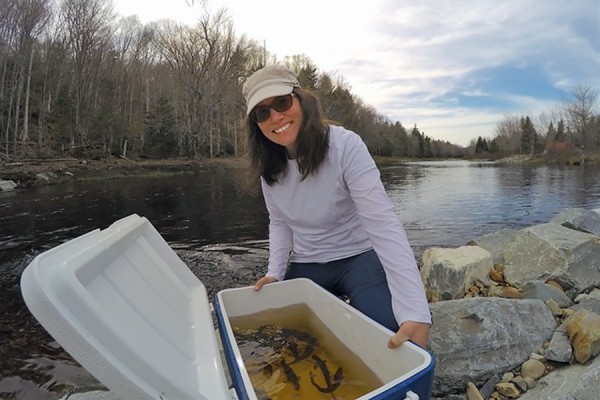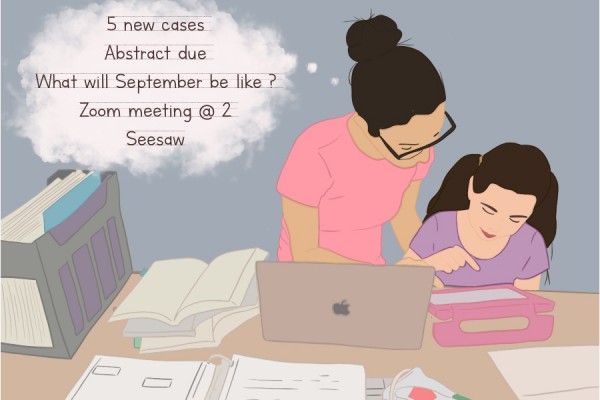 UWindsor professor Christina Semeniuk releases Atlantic salmon smolts in Sheet Harbour, N.S.
UWindsor professor Christina Semeniuk releases Atlantic salmon smolts in Sheet Harbour, N.S.
The University of Windsor is leading a cross-Canada training program that will give students the opportunity to train in freshwater fisheries and fish conservation. The Fisheries management and conservation Careers in Science and Technology (FishCAST) program will provide mentoring and experience to undergraduate and graduate students, and post-doctoral fellows.
“The economic value of freshwater fisheries and aquaculture production, coupled with the current and future pressures on our freshwater resources is driving strong demand for highly qualified personnel to fill jobs within academia, industry, government, and NGOs, and this program will help students develop those marketable skills,” says program director Christina Semeniuk, a professor of integrative biology cross-appointed to the Great Lakes Institute for Environmental Research (GLIER).
UWindsor secured the $1.65 million grant from Natural Sciences and Engineering Research Council of Canada’s (NSERC) Collaborative Research and Training Experience Program (CREATE) for the six-year FishCAST program.
As part of a CREATE grant, FishCAST will provide training in four areas:
- technical expertise in fisheries and fish conservation research methodology and practice;
- focused professional and transferable workplace skills;
- relevant employment and hands-on experience;
- familiarity with the different perspectives and disciplines that contribute to the complex social, economic, and ethical issues facing fish research, conservation, and management.
Mentorship will feature prominently: in addition to the academic partners, FishCAST has more than 50 external collaborators from myriad organizations, including conservation authorities, museums, First Nation communities, commercial and recreational fisheries, and government ministries.
“Our collaborators jumped at the opportunity to be involved by providing internship opportunities, access to data, field and laboratory experiences – it’s a real community involvement,” Dr. Semeniuk says. “They benefit in the long term because they are helping create the next generation of Canadian scientists.”
Chris Houser, dean of the Faculty of Science, says FishCAST is a pivotal project that will contribute to making UWindsor the Destination Science program in Ontario by providing students with unrivalled training opportunities to place them at the forefront of a competitive global field.
“CREATE is notable for providing a unique value-added training program in job readiness and job placement due to the already existing close partnerships co-applicants have cultivated with employers engaged in fisheries and fish culture,” says Dr. Houser.
“This comprehensive, career-oriented training will give our students a competitive edge in the global job market, build on Canada’s global leadership in the field, and place them into economies that matter for Canada by contributing to the effective management and conservation of fish resources.”
Semeniuk says the sustainability of freshwater fish for future generations is particularly pressing within Indigenous communities. One particular focus will be on building and maintaining strong partnerships with Walpole Island First Nations and Chippewas of Nawash Unceded First Nation. There will be dedicated scholarships for Indigenous students to ensure that emerging leaders are mentored in science pathways that align with specific issues directly relevant to their communities.
“With Canada being a global leader in sustainable fisheries research that partners science with Indigenous communities, fostering further training at this nexus is not only strategic, but uniquely effective as well” says Semeniuk. “FishCAST also acknowledges that many groups are still vastly underrepresented in fisheries science in Canada. We will be addressing these systemic issues by promoting a culture of inclusivity, ensuring equal opportunity in our research activities, and focusing on the recruitment and retention of trainees from underrepresented groups.”
FishCAST is distinguished from traditional fisheries programs in Canada in that it is solely freshwater-based. Semeniuk says although freshwater fish contribute significantly to Canada’s economy, environment, biodiversity and food security, they are referred to as the “hidden harvest” because their significance is often overlooked in favour of marine resources.
“Freshwater fish lie at the intersection of two fundamental environmental and social issues facing Canada and, indeed, the world — food security and biodiversity loss,” she says. “We’re at a critical juncture with a quarter of the more than 200 species of freshwater fish considered to be at risk. Since the 1970s alone, 85 per cent have been lost.”
Semeniuk says the first year of the program begins this fall and involves gathering applicants and matching them up with projects, collaborators, and academic mentors. In the long run, her expectations are that FishCAST will be a success in placing trainees into economies that matter for Canada.
—Sara Elliott




